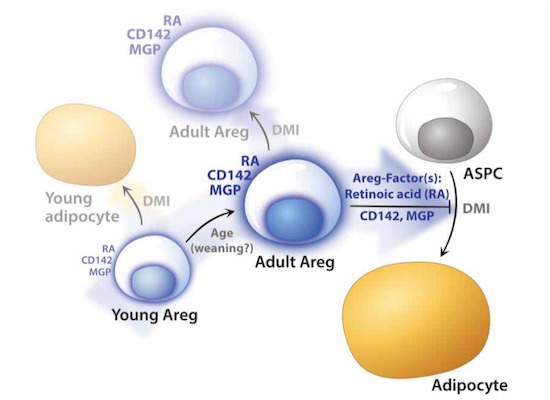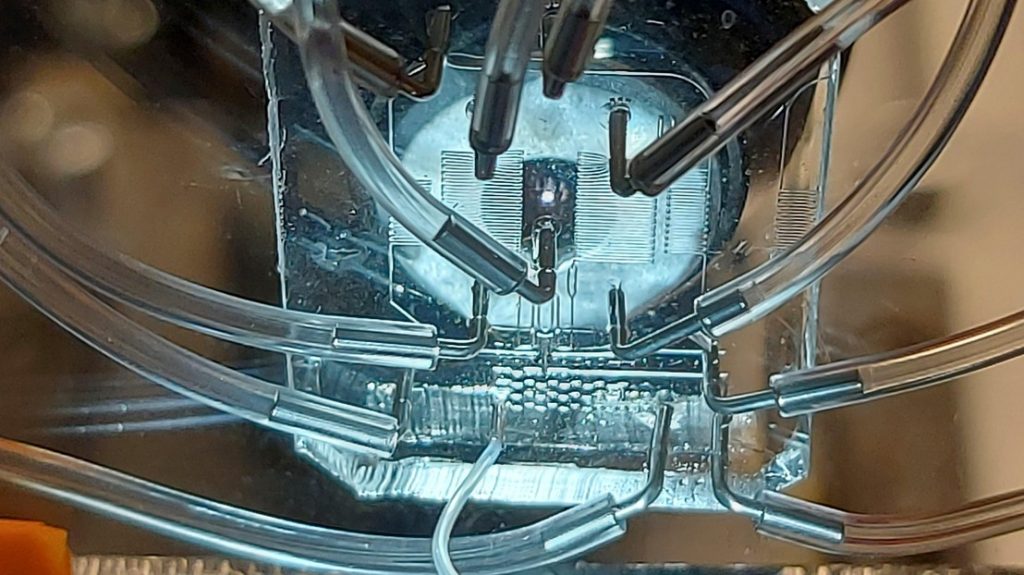16.05.2023
New cells discovered in human omental adipose tissue inhibit fat cell formation, revealing why ‘apple’ body shapes may pose higher metabolic health risks.
- Full article: A human omentum-specific mesothelial-like stromal population inhibits adipogenesis through IGFBP2 secretion in Cell Metabolism.
- EPFL Press release
- RTS Audio & Podcast in French: De nouvelles cellules adipeuses, des plantes “invasives” et la confiance en soi
- swissinfo.ch news in French: EPFL: une piste de l’obésité métaboliquement malsaine identifiée

04.07.2023
Prof. Bart Deplancke elected EMBO member!
The European Molecular Biology Organization (EMBO) has elected 69 new life scientists to membership, joining more than 1800 of the best researchers in Europe and the world. Among the new members is Professor Bart Deplancke at EPFL’s Institute of Bioengineering.

22.08.2022
A recent profiling study by Magda Zachara, Pernille Rainer, Horia Hashimi et al. reports molecular and functional properties of an ASPC subpopulation termed “adipogenesis regulator” (Areg) cells, revealing unexpected paracrine-mediated adipogenic inhibition adjusted during lifetime. The article: “Mammalian adipogenesis regulator (Areg) cells use retinoic acid signalling to be non- and anti-adipogenic in age-dependent manner.” appeared in The EMBO Journal.

17.08.2022
A new technique keeps cells alive during extraction to track the activity of thousands of genes across time. The breakthrough method is called Live-seq and was jointly developed by scientists from the groups of professors Bart Deplancke at EPFL and Julia Vorholt at ETH Zurich.
The work published in Nature is also highlighted by over 30 news outlets such as preLights (Preprints selected by the Biology Community); Le Monde (French), German National Radio (German), and Genetic Engineering & Biotechnology. Its Altmetric score has already exceeded 900.

15.06.2022
Professors Bart Deplancke awarded Advanced Grant from the Swiss National Science Foundation.
SinPhonies project description (Deplancke)
The ability to identify which genes are expressed in a single cell, called single cell transcriptomics (scRNA-seq), is revolutionizing biology by allowing us to address fundamental problems with unprecedented resolution, such as how cells develop into a plastic tissue or how they trigger disease. However, several major technological limitations of scRNA-seq remain.
The project, named SinPhonies for Single cell Phenomic technologies, aims to design two autonomous but synergistic technologies that each address a key limitation to advance single cell phenomena coupled to scRNA-seq.

28.04.2022
Professor Bart Deplancke awarded the Leenaards Science Prize with Dr Jeroen Geurts (CHUV) for a joint research project on obesity and osteoarthritis.
14.02.2022
Bioengineers in Deplancke’s group have found a way to radically increase the efficiency of single-cell RNA-sequencing, a powerful tool that can “read” the genetic profile of an individual cell. Published in Nature Methods, the method is dubbed “DisCo” for “deterministic, mRNA-capture bead and cell co-encapsulation dropleting system”.

26.11.2021
Presentation of Prof. Bart Deplancke with laudation by Prof. Didier Trono at the Cloëtta Prize Ceremony in Zurich.
12.10.2021
A warm welcome to two new PhD students who have recently joined our lab: Jose Antonio Vasquez Porto Viso and Antoni Gralak.
01.06.2021
We thank Dr. Wanze Chen and Dr. Marjan Biocanin for their precious collaboration with our lab for the past few years, and we wish them all the best for their bright scientific careers ahead!
06.05.2021
Congratulations to Prof. Bart Deplancke for being awarded the eminent 2021 Cloëtta Prize!

28.04.2021
Alithea Genomics wins CHF 150,000 from Venture Kick to advance their BRB-seq kit offering and continue to expand the throughput and cost-efficiency of RNA-seq. Congratulations!
15.04.2021
Maria Litovchenko from Bart Deplancke’s group explains how she and her coauthors were able to map circadian gene activity in three tissues of interest and across 140 genomes of Drosophila, by sampling each genotype only once.
11.02.2021
A new lab publication in Science Advances: “Extensive tissue-specific expression variation and novel regulators underlying circadian behavior”
Read EPFL’s press release related to these breakthrough discoveries: “Genes that dance to the circadian rhythm.”
Discover press article from The Academic Times: “Biological clock varies due to gene expression, fruit fly study reveals.”
Listen to a recent interview on the RTS (in French) about this study.

08.02.2021
Congratulations to Dr. Guido Van Mierlo and Dr. Wouter Saelens on being awarded with the prestigious Marie-Curie fellowships!
19.01.2021
Daniel Alpern, Bart Deplancke, and Riccardo Dainese have developed a new technology – MERCURIUS – which offers a quick and cost-efficient way to analyse multiple gene expressions.

31.12.2020
We thank Dr. Magda Zachara for her precious collaboration with our lab for the past five years, and we wish her all the best for her bright scientific career ahead!
11.12.2020
Congratulations to Dr. Guido Van Mierlo on being awarded with the prestigious EMBO fellowship!

03.08.2020
Congratulations to Alithea genomics, an EPFL spin-off using our BRB-seq technology for securing an Innogrant of 100,000CHF.

22.06.2020
Scientists led by Bart Deplancke, head of the Laboratory of Systems Biology and Genetics (LSBG) at EPFL’s Institute of Bioengineering, have developed a new approach to ChIP that promises to automate and lower its cost and complexity. The new method, dubbed “ FloChIP ” uses microfluidics, a bioengineering field that EPFL has helped developing and expanding.

14.02.2020
Congratulations to Dr. Sachi Inukai and Dr. Judith Kribelbauer on being awarded with the prestigious Marie Curie and EMBO fellowships!


17.01.2020
Congratulations to Dr. Michael Frochaux and Dr. Maroun Bou Sleiman on publishing two research papers about Drosophila immunity in Genome biology:
&
Enteric infection induces Lark-mediated intron retention at the 5′ end of Drosophila genes